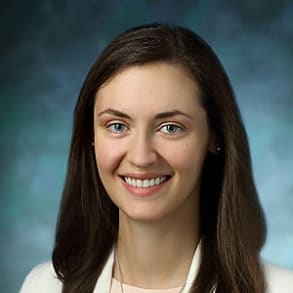Pediatric otolaryngologist Carolyn Jenks discusses Johns Hopkins’ multidisciplinary approach to treating dizziness and balance disorders in pediatric patients.
Okay, hi, my name is Caroline JENKS. I'm a pediatric otolaryngologist at jOHNS Hopkins. I'm pleased to discuss our multidisciplinary approach to dizziness and balance disorders in pediatric patients. Dizziness and imbalance are under reported in Children but affect a significant proportion of the pediatric population, With estimates ranging up to 18%. This is an area of relatively recent and growing focus around the country. Dizziness and imbalance in Children lead to increased falls and impact gross motor skills, development, visual acuity, quality of life and even cognition and academic outcomes, diagnosis and management of these issues requires specialized knowledge. The presentation and most common causes of dizziness and imbalance. And Children differ substantially from adults and Children require a tailored approach since they are less able to provide a detailed history and they require adaptations to engage them in testing using child friendly adaptations. Evaluation of the vestibular system with tests including video nystagmus graffiti, the stimulator evoked cryogenic potentials. Video head impulse testing and rotary chair testing can be performed in pediatric patients here at johNS Hopkins. We take a multidisciplinary approach that allows for a comprehensive evaluation of the child and coordinated care for the family. Children with dizziness and concerns for vestibular dysfunction are seen by pediatric otolaryngology, an audiologist for hearing and balance function testing and uh vestibular physical therapist for a gross motor evaluation. All in a multidisciplinary clinic based on our comprehensive evaluation, we are able to efficiently provide diagnoses and treatment recommendations and coordinate ongoing care for these patients. Some of the most common causes of dizziness and Children include vestibular migraine and other migraine variants. Benign paroxysmal positional vertigo, which is often precipitated by head trauma in Children, otitis media and non vestibular or functional causes of dizziness such as concussion, Ortho stasis and persistent postural perceptual dizziness, gross motor delays and balance issues in Children may be caused by the stimulus hypo function, which can result from malformations of the vestibular labyrinth syndromes affecting the vestibular system like charge ushers or sticklers and prior infections like meningitis and congenital cmV. E. The stimulator hypo function is especially common in Children with hearing loss. Treatment recommendations for patients we see may include lifestyle changes and medications for patients with migraine, cognitive behavioral therapy for patients with functional balance disorders and vestibular physical therapy. Treatment with an experienced pediatric vestibular physical therapist is effective for pediatric patients with various causes of dizziness and improves postural control balance and gait. In patients with vestibular hypo function, we are privileged to be able to offer these comprehensive and advanced services to pediatric patients with dizziness here at johns Hopkins. Yeah



